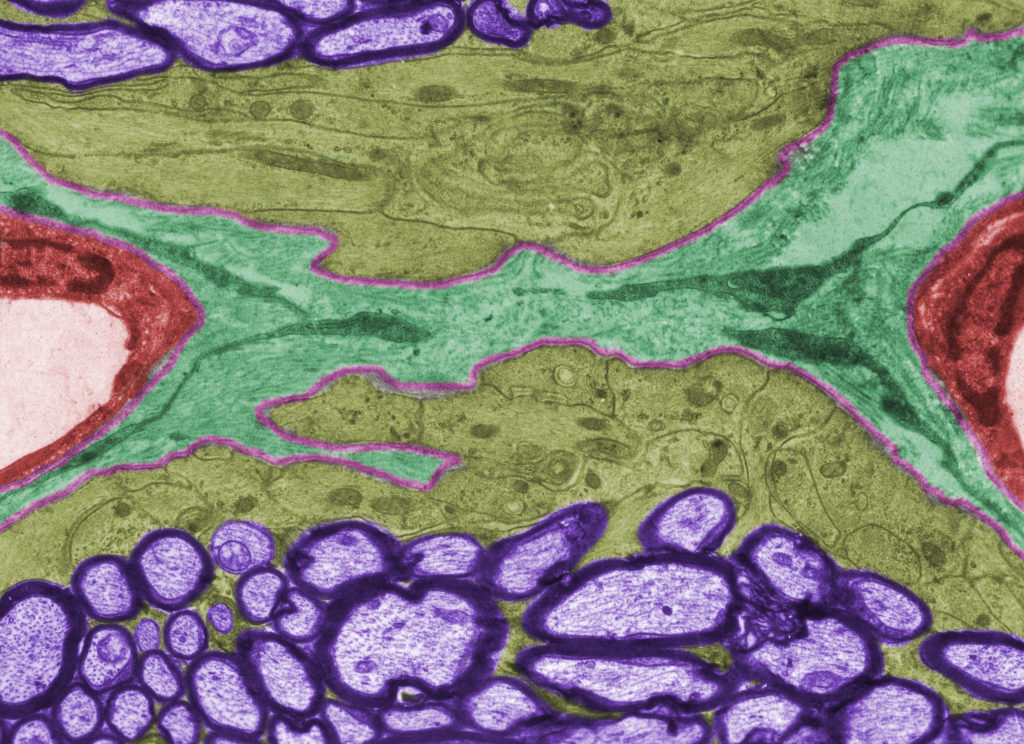Quick Hits
Daily brief research updates from the cognitive sciences

This sounds pretty gruesome – your brain starting to eat itself, like some sort of disease in a horror film. However, research recently published has shown that this process, which we have known about for a long time, is important in developing memory in the short term.
But let’s understand how the brain can eat itself in the first place. There are a number of ways the brain, or rather specific cells in the brain and most of these are good for the brain, digest parts. Firstly, we know that as the brain develops in early childhood there is a key phase of so-called pruning. This is when the brain, or specifically a form of helping cell in the brain called glial cells, cut back connections in the brain. This helps make our brains more efficient and stabilises certain memories and functions.
There are also other processes, and these are often part of everyday cleaning processes whereby a type of glial cell will clear out toxins collected in the brain – and then there is a process whereby damaged cells are cleared out. If the brain does this overenthusiastically, for example after stroke, this can inhibit brain functions.
This we know, but we didn’t know how this works in a day-to-day basis and how this helps plasticity, our brain to develop and learn new things, and therefore memory.
This is where Yosuke M. Morizawa and colleagues at Tohoku University in Japan managed to discover more. They focused on what are called Bergmann Glial Cells and managed to image these as they were “nibbling” on synapses, connections, between neurons.
What was interesting is that when the researchers managed to genetically inhibit this process the learning in mice was blocked. This therefore shows that those cells, by eating away at our brain connections after a learning process, enhance learning.
Therefore, this eating away at our synapses, likely clears out toxins but also improves efficiency of processing and therefore helps us learn more.
So, there you have it your brain eats itself to stay more efficient – but only in a small way, thankfully.

Andy Habermacher
Andy is author of leading brains Review, Neuroleadership, and multiple other books. He has been intensively involved in writing and research into neuroleadership and is considered one of Europe’s leading experts. He is also a well-known public speaker, speaking on the brain and human behaviour.
Andy is also a masters athlete (middle distance running) and competes regularly at international competitions (and holds a few national records in his age category).
References
Yosuke M. Morizawa, Mami Matsumoto, Yuka Nakashima, Narumi Endo, Tomomi Aida, Hiroshi Ishikane, Kaoru Beppu, Satoru Moritoh, Hitoshi Inada, Noriko Osumi, Eiji Shigetomi, Schuichi Koizumi, Guang Yang, Hirokazu Hirai, Kohichi Tanaka, Kenji F. Tanaka, Nobuhiko Ohno, Yugo Fukazawa, Ko Matsui.
Synaptic pruning through glial synapse engulfment upon motor learning.
Nature Neuroscience, 2022
DOI: 10.1038/s41593-022-01184-5
More Quick Hits
Your Job Can Protect You From Cognitive Decline
Quick HitsDaily brief research updates from the cognitive sciences f you have the right job that is. First let’s understand what the researchers were investigating. There is something strange going on with Alzheimer’s - we know that in Alzheimer’s...
How Nature Is Good For Your Health
Quick HitsDaily brief research updates from the cognitive sciences have reported multiple times how nature is good for your health. For example, in my article on the simple benefits of walking I also show how nature helps in multiple ways such a...
Do Your Chores, You’ll Live Longer – And Better!
Quick HitsDaily brief research updates from the cognitive sciences o, I haven’t been paid to write this by irate spouses or parents! Fact is doing the chores could be very beneficial to your wellbeing. How so you may ask? Well, I admit I have...
Why Having a Hit Reduces Creativity
Quick HitsDaily brief research updates from the cognitive sciences n music this happens often – a band lands a hit but then fails to do anything special again. A well-known occurrence with hits like Tequila in 1958 being the ultimate one-hit wonder...
The Surprising Results Of How Music Reduces Pain in Your Brain
Quick HitsDaily brief research updates from the cognitive sciences hen you’re in pain any form of relief is welcome – we tend to immediately revert to pain killers but there are many other methods of, at least, reducing pain. I have recently...
Smartphones Improve Your Memory
Quick HitsDaily brief research updates from the cognitive sciencesany people believe that using smartphones and other electronic devices is ruining our memories and ability to think or simply use our brains. Research has shown a more nuanced...






